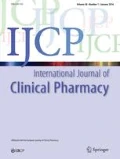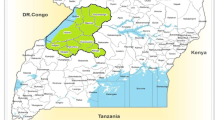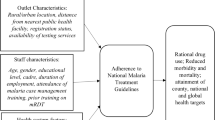Abstract
Objective To obtain information about the staff resources available in licensed medicine outlets, assess their knowledge about malaria illness, current policy initiatives for malaria control, and the practices for prevention and management of malaria. Setting Hospitals/clinics and retail medicine outlets (community pharmacies and licensed chemical shops) from urban and rural areas in Southern and Northern Ghana. Method A cross section of medicine outlets (n = 121) in the two geographic and socio-economically diverse settings in Ghana were sampled. Data on staff resources, their knowledge about malaria, and current initiatives for malaria control were obtained through structured interviews. Staff practices for prevention and management of malaria were assessed through observation of their practice during counseling, selection, and dispensing of anti-malarial. Main outcome measures Professional status of staff in the outlets, the proportion of staff with adequate knowledge on malaria illness and the initiatives for malaria control; skills and practices for the recognition, prevention, and management of malaria. Results 56% of the staff (n = 269) were non-professionals, whereas 44% (n = 212) were professionals. The hospitals/clinics had more professional staff per outlet than the retail outlets. One hundred and fifty four staff members, including those in-charge of the outlets at the time of data collection (n = 121), and others recommended by the in-charges or outlet owners (n = 33) were assessed. Of these, 83% knew the mode of malaria transmission, 81% could advise clients on practices for malaria prevention, 88% recognized signs/symptoms of uncomplicated malaria, and 64% those of complicated malaria. Less than 40% had adequate knowledge about current initiatives for malarial control, and only 21% could manage malaria cases as recommended by national guidelines. Conclusion Most of the staff, particularly those in the retail outlets were not professionally trained. The staff assessed could recognize malaria illness and counsel clients on practices for disease prevention. The majority, however, lacked knowledge on the current initiatives for malaria control and the skills to manage malaria cases appropriately. In order to achieve public health objectives, interventions to strengthen skills and improve practices for malaria case management are needed. Training on current initiatives for malaria control should also be considered a priority.

Similar content being viewed by others
References
Owusu-Agyei S, Awuni E, Anto F, Mensah-Afful T, Adjuik M, Hodgson A, et al. Assessing malaria control in the Kassena-Nankana district of northern Ghana through repeated surveys using RBM tools. Malar J. 2007;6:103–11.
Malaria operational plan-FY08 Ghana. President’s malaria initiative. 2007. http://www.fightingmalaria.gov/countries/ghana_mop-fy08.pdf. Accessed 12 Mar 2008.
Were W. Bringing malaria management closer to the home—roll back malaria, WHO. 2004. http://www.who.int/malaria/docs/Home_management_of_malaria2.pdf. Accessed 15 Sept 2007.
Goodman C, Brieger W, Unwin A, Meek S, Greer G. Medicine sellers and malaria treatment in sub-Saharan Africa: what do they do and how can their practice be improved. Am J Trop Med Hyg. 2007;77:203–18.
Buabeng KO, Duwiejua M, Dodoo ANO, Matowe LK, Enlund H. Self-reported use of anti-malarial drugs and health facility management of malaria in Ghana. Malar J. 2007;6:85–90.
Adeya G, Tetteh G. Rational pharmaceutical management plus meeting of stakeholders to discuss the implementation plan for the new drug policy for malaria: trip report. 2004. http://pdf.usaid.gov/pdf_docs/PDACI119.pdf. Accessed 3 Aug 2009.
Hetzel MW, Dillip A, Lengeler C, Obrist B, Msechu JJ, Makemba AM, et al. Malaria treatment in the retail sector: knowledge and practices of drug sellers in rural Tanzania. BMC Public Health. 2008;8:157–67.
Roll Back Malaria Case Management Working Group. The role of medicine sellers in the management of malaria: what’s worked and where do we go from here? 2004. http://www.rbm.who.int/partnership/wg_management/docs/medsellersRBMmtgreport.pdf. Accessed 24 Feb 2008.
Montgomery CM, Mwengee W, Kong’ongo’ M, Pool R. To help them is to educate them: power and pedagogy in the prevention and treatment of malaria in Tanzania. Trop Med Int Health. 2006;11:1661–9.
Tugwell P, Robinson V, Grimshaw J, Santesso N. Systematic reviews and knowledge translation. Bull World Health Organ. 2006;84:643–7.
Lambo E. More good than harm. Lancet. 2005;365:1765.
Ridley RG. Antimalarial drug resistance: ramifications, explanations and challenges. Microbe Infect. 2002;4:155–6.
Buabeng KO, Duwiejua M, Matowe LK, Smith F, Enlund H. Availability and choice of antimalarials at medicine outlets in Ghana: the question of access to effective medicines for malaria control. Clin Pharmacol Ther. 2008;84:613–9.
Abuya TO, Mutemi W, Karisa B, Ochola SA, Fegan G, Marsh V. Use of over-the-counter malaria medicines in children and adults in three districts in Kenya: implications for private medicine retailer interventions. Malar J. 2007;6:57–66.
Onwujeke O, Uzochukwu B, Ojukwu J, Dike N, Shu E. Feasibility of a community health worker strategy for providing near and appropriate treatment of malaria in southeast Nigeria: an analysis of activities, cost and outcomes. Acta Trop. 2007;101:95–105.
Talisuna AO, Meya ND. Diagnosis and treatment of malaria. BMJ. 2007;334:375–6.
Worrall E, Morel C, Yeung S, Borghi J, Webster J, Hill J, et al. The economics of malaria in pregnancy-a review of the evidence and research priorities. Lancet Infect Dis. 2007;7:156–68.
Dieleman M, Harnmeijer JW. Improving health worker performance: in search of promising practices. 2006. http://www.who.int/hrh/resources/improving_hw_performance.pdf. Accessed 14 Sept 2007.
Hommerich L, von Oertzen C, Bedu-Addo G, Holmberg V, Acquah PA, Eggelte TA, et al. Decline of placental malaria in southern Ghana after the implementation of intermittent preventive treatment in pregnancy. Malar J. 2007;6:144–51.
Mbwasi R. Enhancing access to medicines through private and multi-sector initiatives: the Tanzanian experience. 2005. http://www.msh.org/seam/conference2005/pdf. Accessed 18 Nov 2007.
de Castro MC, Yamagata Y, Mtasiwa D, Tanner M, Utzinger J, Keiser J, et al. Integrated urban malaria control: a case study in Dar es Salaam, Tanzania. Am J Trop Med Hyg. 2004;71:103–17.
Chen L, Evans T, Boufford, Brown H, Chowdhury M, et al. Human resources for health: overcoming the crisis. Lancet. 2004;27:1984–90.
Hatzel MW, Iteba N, Makemba A, Mshana C, Lengeler C, Obrist B, et al. Understanding and improving access to prompt and effective malaria treatment and care in rural Tanzania: the access programme. Malar J. 2007;6:83–97.
Acknowledgments
We thank Prof Kwame Sarpong of KNUST, the Chief Pharmacist and the Registrar of Pharmacy Council for their support of in this study. We also thank Kirsti Vainio (PhD) of the School of Pharmacy (Social Pharmacy), University of Eastern Finland, Kuopio, for her valuable inputs. Finally, we thank the chief executives and owners of all the medicine outlets who allowed us to use their facilities for the study.
Funding
The study was funded by the Elli Turunen fund of the Finnish Cultural Foundation and Faculty of Health Sciences, University of Eastern Finland, Kuopio.
Conflict of interest statement
None.
Author information
Authors and Affiliations
Corresponding author
Rights and permissions
About this article
Cite this article
Buabeng, K.O., Matowe, L.K., Smith, F. et al. Knowledge of medicine outlets’ staff and their practices for prevention and management of malaria in Ghana. Pharm World Sci 32, 424–431 (2010). https://doi.org/10.1007/s11096-010-9397-6
Received:
Accepted:
Published:
Issue Date:
DOI: https://doi.org/10.1007/s11096-010-9397-6




